Table of Contents
Is It Still Safe to Enter the Property Market In 2025 Amid U.S. Tariffs?
With renewed concerns about a possible recession in 2025, many homeowners and investors in Singapore may begin to ask the pressing question: Is it still safe to enter the property market?
Over the past few years, property prices have climbed steadily, buoyed by strong demand, limited supply, and a stable economic environment. But with global uncertainties piling up — from shifting interest rate policies to geopolitical tensions — it’s understandable that some might hesitate before making their next move.
The short answer? Yes — and here’s why. Backed by decades of historical data, sound economic fundamentals, and well-calibrated government policies, the Singapore property market continues to be a stable and resilient asset class. For buyers and investors with a long-term perspective, the current environment still offers opportunities — especially when approached with careful planning and clear objectives.
Recession Fears Resurface Amid New U.S. Tariffs
On April 8, 2025, Singapore’s Prime Minister Lawrence Wong addressed Parliament, expressing deep concern over the United States’ recent imposition of a 10% universal tariff on imports, including goods from Singapore. He described the move as a “seismic change in the global order,” warning that it poses significant risks to Singapore’s trade-dependent economy and challenges the long-standing principles of free and open trade.
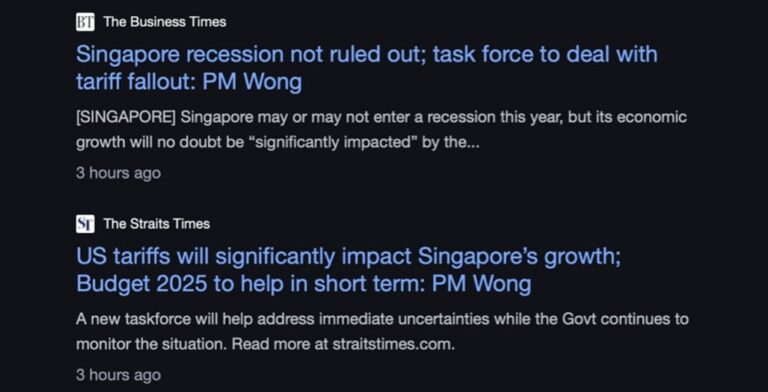
In response to these developments, the government announced the formation of a National Task Force chaired by Deputy Prime Minister and Minister for Trade and Industry Gan Kim Yong. This task force includes key partners such as the Singapore Business Federation, the Singapore National Employers Federation, and the National Trades Union Congress (NTUC). They aim to assist businesses and workers in navigating the uncertainties arising from the tariffs.
Meanwhile, Budget 2025, rolled out earlier this year, includes a range of short-term support measures to help Singaporeans cope with rising costs and economic uncertainty. These measures include CDC and SG60 vouchers, utility rebates, and enhanced assistance through SkillsFuture and the SkillsFuture Jobseeker Support Scheme.
PM Wong noted that while it’s uncertain whether Singapore will officially enter a recession this year, the economy is expected to be significantly impacted. The Ministry of Trade and Industry is reviewing its 2025 GDP growth forecast, which was previously set between 1% and 3%, with a likely downward revision.
Naturally, the possibility of a recession raises concerns — particularly for those considering large financial decisions such as buying property. However, it’s essential to understand that a recession doesn’t automatically translate to a property market crash. In Singapore, the property market is shaped by more than just GDP figures — it is supported by demand-supply dynamics, policy interventions, market resilience, and investor sentiment, all of which play critical roles.
What History Tells Us: 16 Recessions, But Not Always a Property Crash
Since 1990, Singapore has experienced 16 periods of recession, defined as two or more consecutive quarters of GDP contraction. While the term “recession” naturally raises concern, historical data suggests that it doesn’t always lead to a drop in property prices — particularly in Singapore’s context.
Out of those 16 recessions, only 8 were followed by property market declines — a 50% occurrence rate. That means the property market remained stable or even appreciated in half of those downturns.
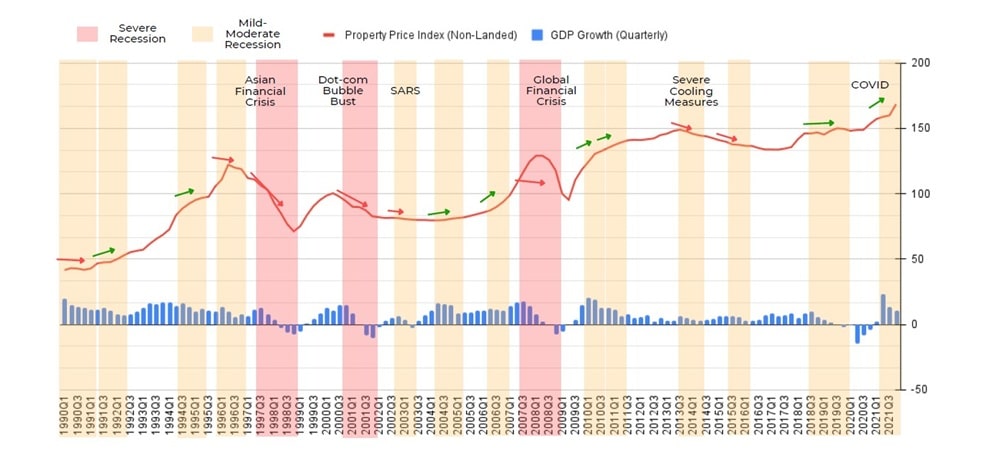
When we look closer, the three most severe price corrections occurred during extraordinary global events—the 1998 Asian Financial Crisis, the 2008 Global Financial Crisis, and the 2020 COVID-19 pandemic. These were systemic shocks that impacted not only Singapore but the entire global financial system, resulting in sharp contractions in confidence, liquidity, and economic activity.
The remaining 13 recessions were considered mild to moderate, and in 8 of those instances, property prices in Singapore continued to hold or rise. That’s a 61.5% probability that real estate values remained resilient despite economic slowdowns.
This tells us that not all recessions are created equal—and not all will cause property prices to fall. The severity and underlying cause of a recession matter. In periods of manageable downturns—such as the dot-com bubble, trade slowdowns, or health-related events like SARS—Singapore’s property market has shown its strength, underpinned by local demand, sound fundamentals, and timely government intervention.
The "Dam Effect": How Policy Safeguards Cushion Singapore's Property Market
Since 2013, Singapore has taken deliberate steps to engineer a more stable and sustainable property market. One of the most effective outcomes of this effort is what many observers now refer to as the “dam effect.”
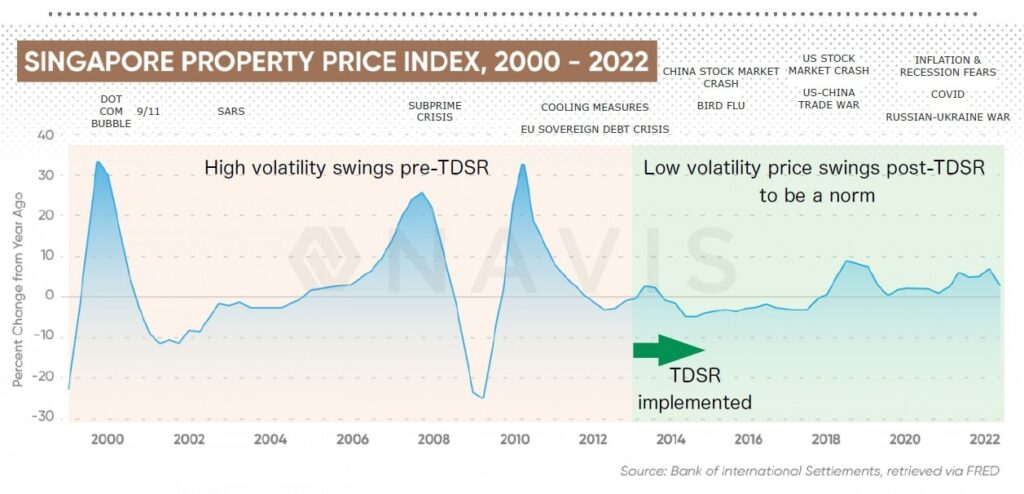
Much like how a dam controls water flow, Singapore’s property policies have helped moderate market cycles, preventing excessive booms and steep crashes. This stability is largely credited to a carefully layered set of macro-prudential measures, including:
- Loan-to-Value (LTV) limits
- Total Debt Servicing Ratio (TDSR) framework
- Additional Buyer’s Stamp Duty (ABSD)
- Seller’s Stamp Duty (SSD)
- And a suite of targeted cooling measures
With the proper rules in place, this system of layered protection has strengthened household financial resilience and reduced speculative activity. Buyers today are more cautious and better prepared, while owners generally hold on to properties with healthier cash flow positions.
Over the past decade, even during external shocks like trade conflicts, health pandemics, or cyclical economic dips, property prices in Singapore have shown remarkable resilience. When they occur, market corrections tend to be shallow and short-lived, and prices often recover quickly once stability returns.
This “dam effect” doesn’t mean the market is invincible. But it does mean that shocks are less likely to trigger panic selling or severe downturns, giving homeowners and long-term investors a greater sense of security.
Falling Interest Rates and the Return of Investor Confidence
As we head deeper into 2025, one key economic trend is drawing close attention — the prospect of falling interest rates. With global growth uncertainties and easing inflation, the U.S. Federal Reserve has signaled the possibility of at least two rate cuts this year, and market watchers believe more may follow if conditions worsen.
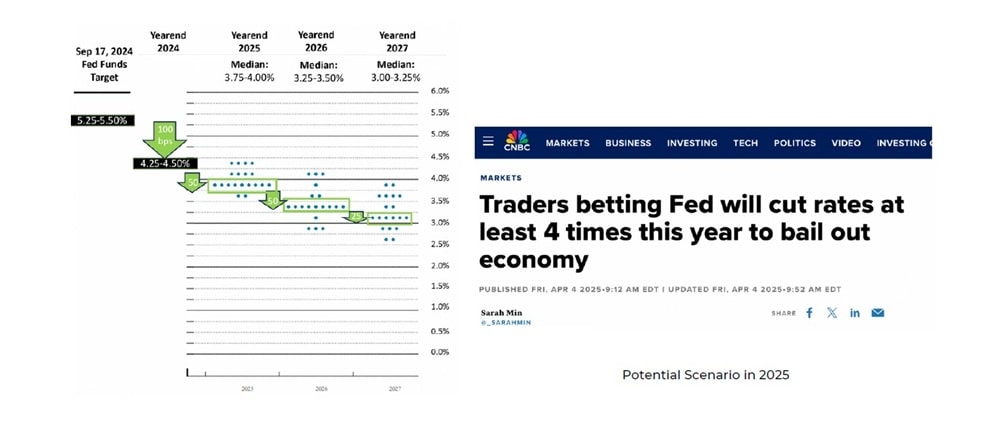
Typically, the Fed reduces interest rates in 25 basis point increments, which may seem marginal at first glance. However, these cuts can substantially impact borrowing costs, especially for homebuyers and property investors.
In Singapore, fixed mortgage rates are currently around 2.4%. Should rates begin to decline, monthly instalments will naturally decrease. This translates into better cash flow for landlords, particularly if they are still enjoying decent rental income. When instalment burdens ease, the urgency to sell also lessens, which helps to stabilise property prices even during broader economic uncertainty.
At the same time, the volatile stock market environment is prompting some investors to re-evaluate where they park their capital. As risk appetite shifts, many are turning toward real estate as a more stable and tangible investment that offers both long-term capital growth and rental yield.
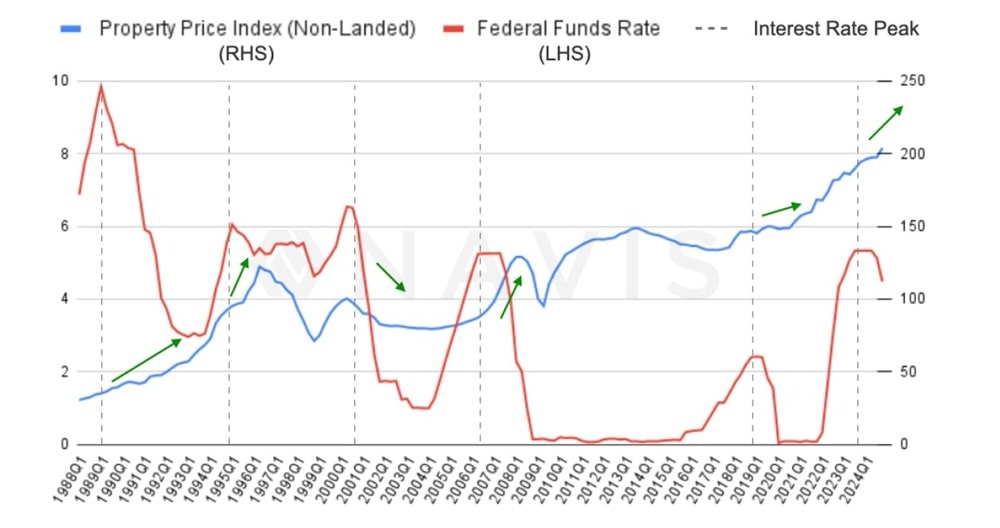
Historically, Singapore’s property market has responded positively to such scenarios. Property prices have appreciated four out of five times after interest rates peaked and began to fall. The low interest rate environment tends to revive buyer interest, especially among seasoned investors seeking predictable returns.
If this cycle plays out similarly, we may see renewed activity from both local and foreign investors, particularly in sought-after areas with limited new supply — reinforcing the market’s resilience through yet another period of global volatility.
Supply-Demand Fundamentals Remain Supportive
While interest rates and macroeconomic shifts tend to dominate headlines, one of the most grounded indicators of property market resilience is still the classic balance of supply and demand — and in Singapore, that balance continues to point toward strength and stability in the years ahead.
Between 2025 and 2027, the supply of newly completed private residential units is expected to fall significantly below the 10-year average of 12,000 units per year. Current projections estimate about 5,300 units in 2025, 7,600 in 2026, and 11,000 in 2027. With fewer new units entering the market, competition for available homes is likely to remain strong, especially in established and high-demand areas.
On the demand side, we continue to see a steady flow of HDB owners reaching their Minimum Occupation Period (MOP), many of whom are ready to take the next step in their property journey. Backed by CPF savings and built-up equity from their first home, these upgraders form a consistent demand base for both new launches and resale condominiums.
That said, 2025 is projected to see the lowest number of MOP flats in 11 years, with only 6,974 HDB units reaching eligibility for resale. This reduced supply of MOP flats means fewer upgraders entering the private market, which may help support HDB resale values and limit excess pressure in the private resale segment.
In particular, the Outside Central Region (OCR) and the Rest of Central Region (RCR) — where most upgraders tend to buy — are expected to face continued demand amid limited upcoming supply. A slowdown in Government Land Sales (GLS) and fewer successful en bloc transactions have also restricted developers’ ability to replenish their landbanks, adding to the tight supply situation.
At the same time, Singapore’s broader fundamentals remain strong. Population growth, political stability, a healthy rental market, and a resilient job landscape are all key drivers supporting housing demand — both from locals and foreign residents.
When supply is constrained, and demand is genuine, prices tend to stay supported. This creates a favorable backdrop for buyers and investors who are focused on long-term value, rather than short-term market noise. The fundamentals are intact; for many, that’s reason enough to stay confident.
Final Thoughts: Is It Still Safe to Enter the Property Market?
As we navigate through a period of global economic uncertainty, it’s natural for buyers and investors to feel cautious. Headlines may be filled with concerns over recession risks, trade tensions, and shifting interest rates. Yet, amidst the noise, Singapore’s property market continues to offer clarity, resilience, and long-term value.
No one can predict the future with absolute certainty. But when we look at the facts, history, and the safeguards in place, there’s plenty of reason to take heart and remain calmly confident in Singapore real estate as a stable, long-term asset.
Here’s why:
- Our economy is strong, and the government remains proactive in responding to evolving conditions.
- Multiple cooling measures — such as ABSD, SSD, LTV limits, and TDSR — can be eased if needed, providing tools to support the market.
- Local demand is genuine and steady, backed by CPF savings and long-term homeownership needs.
- The Singapore Dollar remains a strong and trusted currency, reinforcing our market’s value in times of global currency volatility.
- Real estate here has consistently shown resilience during past recessions, bouncing back stronger when global conditions stabilize.
In fact, the more uncertain the world becomes, the more attractive Singapore’s real estate appears — not just to local buyers but also to foreign investors and global businesses looking for a safe, stable, and transparent market.
The ballasts of our property market — from financial prudence to policy safeguards — are firmly in place to weather storms. Whether you’re a first-time homebuyer, an upgrader, or a long-term investor, entering the market today isn’t just about timing the cycles — it’s about making a confident and well-informed step toward long-term security and growth.
So, is it still safe to enter the property market?
With the right mindset, strategy, and guidance — absolutely, yes.
If you’re seeking property-related advice, feel free to reconnect for a friendly chat and explore how we can plan your journey together.
Need Real Estate Consultation?
Contact Me
Feel free to connect with me!
Senior Associate District Director
Huttons Asia Pte Ltd
CEA Registration No.: R026434F
Agency License: L3008899K
Contact: +65 9383 9588
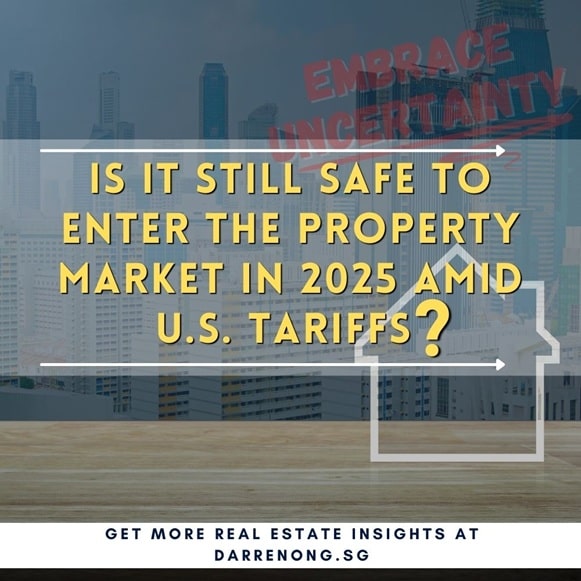
Is It Still Safe to Enter the Property Market In 2025 Amid U.S. Tariffs?
Is it safe to enter the Singapore property market in 2025 amid recession fears and U.S. tariffs? Learn how interest rates, supply trends, and market resilience could shape your next move.
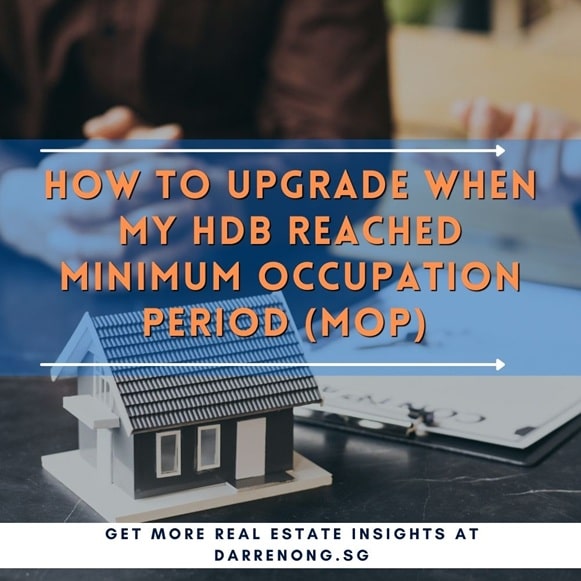
How to Upgrade When My HDB Reached Minimum Occupation Period (MOP)
For HDB owners who have fulfilled the 5-year MOP (Minimum Occupation Period) in Singapore, discover your next move. Find out if you should sell your flat (resale HDB) or upgrade to a private property, with clear tips for smart homeownership planning.

Freehold Vs Leasehold Properties, Which Suit You Best?
Explore the key differences between freehold and leasehold properties in Singapore. Understand their advantages, investment potential, and determine which property type aligns with your goals.

How Much Do You Need to Earn to Afford a Condo in Singapore?
How much salary do you need to buy a condo in Singapore? Calculate loan, cash, CPF needed & avoid costly mistakes. Read the full guide now!
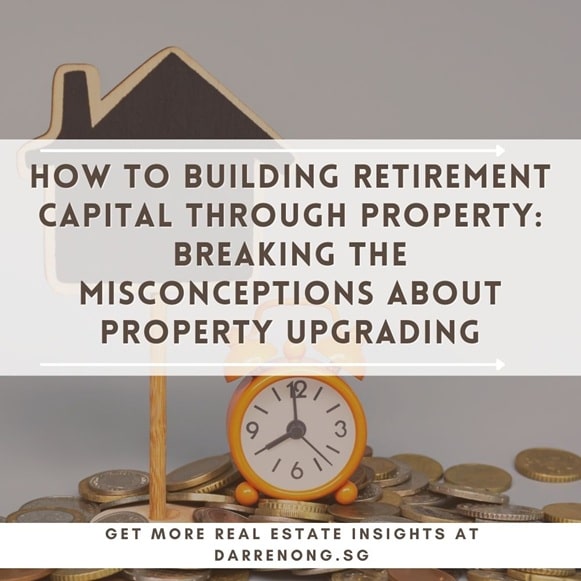
How To Building Retirement Capital Through Property: Breaking the Misconceptions About Property Upgrading
Looking to grow your retirement capital in Singapore? Discover how smart property upgrading and strategic investments can accelerate your wealth-building journey. From first-time buyers to seasoned homeowners, learn how to leverage property for long-term financial freedom.

Singapore Property Market Outlook 2025: The Trends, Risks, and Opportunities
Explore the 2025 Singapore property market outlook, price trends, and investment opportunities. Understand supply, demand, and interest rates to make informed decisions on buying, upgrading, or investing in real estate. Read more insights here!



